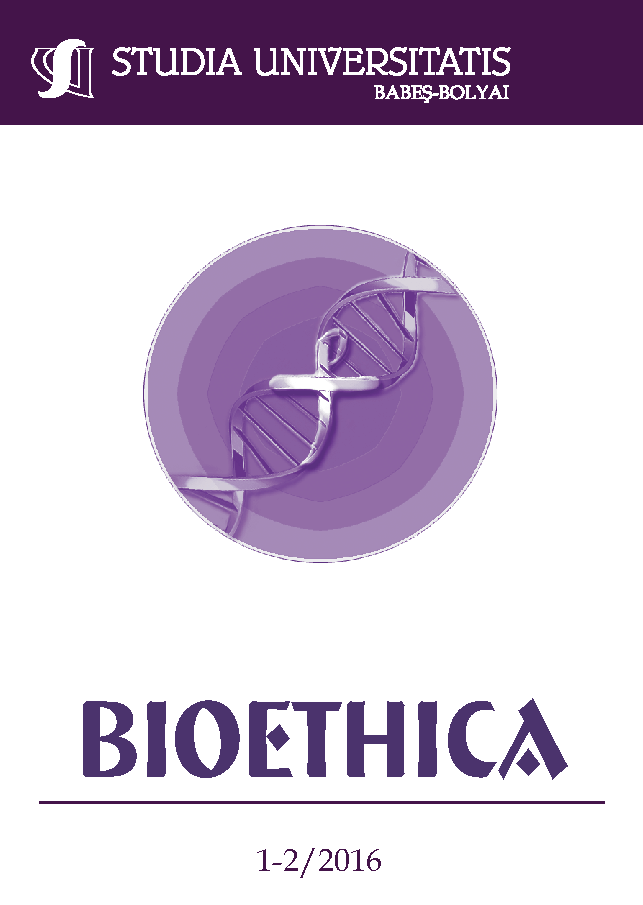BIOETHICAL CONCEPTS RELATED TO HEMATOPOIETIC STEM CELL TRANSPLANTATION IN THE RELIGIOUS AND SOCIO-CULTURAL CONTEXT
Keywords:
bioethics, hematopoietic stem cell transplantation (HSCT), blood transfusion, allo-grafting, auto-graftingAbstract
Translational medicine is a modern discipline which aims to create a bridge between experimental research, clinical research and implementation of all these scientific data into clinical practice. Translational medicine also entails legal and socio-cultural aspects that can decide the outcome of this process. In hematopoietic stem cell transplantation (HSCT), research emphasizes the concept of stem cell, continuously updated, necessary for the clinical improvement of allo- and autografting of hematopoietic stem cells. Between the experimental data and the clinical practice itself, there can be gaps, sometimes related to the capacity of obtaining viable and useful results through research, or the approach to a medicine which is not sufficiently centered on the patient. This last obstacle has been studied by the authors. The main objective of the paper was to establish whether the patient’s religious beliefs can influence the choice for stem cell therapy. The paper presented four cases of patients from the Hematology Clinic, Emergency Clinical County Hospital of Arad. The results showed that the patients had a crucial role in selecting the HSCT therapy. Two patients underwent HSCT; one of them refused the allo-grafting for religious considerations. One of the most frequent reasons invoked by the patients is the refusal of blood and blood product transfusions based on social, cultural and religious grounds.
Concepte bioetice relative la transplantul cu celule stem în contextul religios și socio-cultural. Medicina translațională este o disciplină modernă care își propune să creeze o punte de legătură între cercetarea experimentală, cercetarea clinică și implementarea tuturor acestor date științifice în practica clinică. Medicina translațională presupune, de asemenea, aspecte juridice și socio-culturale care pot avea rol decisiv în rezultatul acestui proces. În transplantul de celule stem hematopoietice (HSCT), cercetarea evidențiază conceptul de celule stem, actualizat continuu, necesare în ameliorarea clinică a alo- și autogrefelor de celule stem hematopoietice. Între datele experimentale și practica clinică în sine, pot exista lacune, uneori legate de capacitatea de a obține rezultate viabile și utile prin cercetare sau privind abordarea unei medicini care nu este suficient centrată pe pacient. Acest ultim obstacol a fost studiat de autori. Obiectivul principal al lucrării a fost de a stabili dacă convingerile religioase ale pacientului poate influența alegerea pentru terapia cu celule stem. Lucrarea a prezentat patru cazuri de pacienți de la Clinica de Hematologie, Spitalul Clinic Județean de Urgență Arad. Rezultatele au arătat ca pacienții au avut un rol crucial în selectarea terapiei HSCT. Doi pacienți au urmat HSCT; unul dintre ei a refuzat alogrefa din considerente religioase. Una dintre cele mai frecvente motive invocate de către pacienți este refuzul sângelui și a produselor sanguine, bazat pe motive sociale, culturale și religioase.
Cuvinte-cheie: bioetică, transplant de celule stem hematopoietice (HSCT), transfuzii de sânge, alo-grefare, auto-grefare.
References
C. Davis, G. Randhawa - The influence of religion on organ donation and transplantation among the Black Caribbean and Black African population--a pilot study in the United Kingdom, Ethn Dis., Winter;16(1):281-5., 2006
Sigrid Droste, Annegret Herrmann-Frank, Fueloep Scheibler, Tanja Krones - Ethical issues in autologous stem cell transplantation (ASCT) in advanced breast cancer: A systematic literature review, BMC Medical Ethics, BMC series, BioMed Central Ltd., 2011, available at: http://bmcmedethics.biomedcentral.com/articles/10.1186/ 1472-6939-12-6
Janine F. Farragher, Meghan J. Elliott, Samuel A. Silver, Zsuzsanna Lichner, Anne Tsampalieros - Translational research in kidney transplantation and the role of patient engagement, Canadian Journal of Kidney Health and Disease 2:42, 2015
S. Hostiniuc, A. Moldoveanu, M.I. Dascalu, R. Unnthorsson, O.I. Johannesson, I. Marcus - Translational research—the need of a new bioethics approach, Journal of Translational Medicine14:16, 2016
Christopher FC Jordens, Michelle AC O’Connor, Ian H Kerridge, Cameron Stewart, Andrew Cameron, Damien Keown, Rabbi Jeremy Lawrence, Andrew McGarrity, Abdulaziz Sachedina, Bernadette Tobin - Religious perspectives on umbilical cord blood banking C, 19 JLM 497, 2012
J.M. Sloan, K. Ballen - SCT in Jehovah’s Witnesses: the bloodless transplant, Bone Marrow Transplantation 41, 837–844, Nature Publishing Group, 2008
S.A. Waldman, A. Terzic - Clinical and translational science: from bench-bedside to global village, Clin Transl Sci. 3(5):254-7, 2010
F. Zahedi-Anaraki, B. Larijani - Stem Cells: Ethical and Religious Issues, Bioethics in the 21st Century, Prof. Abraham Rudnick (Ed.), ISBN: 978-953-307-270-8, InTech, 2011, available at: http://www.intechopen.com/books/bioethics-in-the-21st-century/stem-cells-ethical-and-religious-issues.
*** Convention for the Protection of Human Rights and Dignity of the Human Being with regard to the Application of Biology and Medicine: Convention on Human Rights and Biomedicine (CHRB), 1997, available at: https://rm.coe.int/CoERMPublicCommonSearchServices/DisplayDCTMContent?documentId=090000168007cf98.
*** Law no. 46/2003 on patients’ rights
*** Law no. 104/2003 on Handling Human Corpses and Harvesting of Organs and Tissues from Corpses for Transplantation Purposes (republished in 2014)
*** Law no. 95/2006 on Health Reform, republished in 2015
*** Order of the Minister of Health no. 477/2009 on the establishment of the National Registry of Transplant within sanitary units, designating persons responsible for the management of data from the National Registry of Transplant within health units accredited to perform organ transplantations and establishing the data required for registration of a person for the assignment of the unique registration code from National Transplant Agency
*** Law no. 47 of 14 March 2013 amending and supplementing Law no. 104/2003 on the handling of cadavers and removal of organs and tissues for transplantation from cadavers
*** Order of Minister of Health no. 1527/2014 on methodological norms to apply title VI “Harvesting and Transplanting Organs, Tissues and Cells of Human Origin for Therapeutic Purposes” from Law no. 95/2006 on Health Reform
*** Law no. 9/2016 of 18 January 2016 for ratifying the Additional Protocol to the European Convention for the protection of human rights and human dignity regarding the applications of biology and medicine, with reference to the Transplantation of Organs and Tissues of Human Origin.
Downloads
Published
How to Cite
Issue
Section
License
Copyright (c) 2016 Studia Universitatis Babeș-Bolyai Bioethica

This work is licensed under a Creative Commons Attribution-NonCommercial-NoDerivatives 4.0 International License.






